Senate bill would bar concrete-crushing within 440 yards of hospitals after LBJ community outcry
Get AI-powered insights, summaries, and transcripts
Subscribe
Summary
Senate Bill 2082, filed by Senator Borris L. Miles, would add hospitals to the list of sensitive sites that rock- and concrete-crushing facilities may not operate within 440 yards.
Senate Bill 2082, filed by Senator Borris L. Miles, would add hospitals to the list of sensitive sites that rock- and concrete-crushing facilities may not operate within 440 yards. The bill was laid out in the Senate Committee on Natural Resources & Economic Development hearing after community opposition to a proposed crushing operation near Lyndon B. Johnson (LBJ) Hospital in Houston.
The bill’s author described the bill’s purpose and local controversy. "SB 20 82 is a simple bill. It adds hospitals to the list of places that rock crushing concrete may not operate within 440 yards," Senator Miles said, arguing the current standard does not protect medically vulnerable patients. He noted the LBJ site drew more than 630 public comments opposing the permit and said the hospital is "the busiest level 3 trauma center in Texas" and an "irreplaceable link" in indigent care.
Why it matters: supporters said concrete crushing generates dust, regulated air pollutants, noise, intrusive lighting and heavy truck traffic that can worsen asthma and other health risks for patients, staff and nearby residents. Sarah Utley, environmental division director for the Harris County Attorney’s Office, testified in support and called the bill a "narrowly tailored solution to a critical policy gap," saying hospitals should be afforded the same buffer as residences, schools and places of worship.
Harris Health’s Patrick Casey said the proposed facility would threaten patients and staff and pointed to a major local hospital investment: "We're currently in construction of the which will be the third level 1 trauma center for the city of Houston. It's about a $2,000,000,000 investment which is supported by the taxpayers." Public Citizen’s Adrian Shelley also testified in favor, saying the change aligns statutory siting protections with public-health priorities and cited vulnerable populations—children, the elderly and people with respiratory illnesses—as often concentrated in hospitals.
TCEQ resource witness Samuel Short said the agency’s standard permits are written to protect sensitive populations where feasible, and noted TCEQ held an informational public meeting on Dec. 7, 2023, about the proposed permit. Short said the commission does not track how many crushing facilities nationwide or statewide fall within 440 yards of hospitals and that assembling that dataset would require extensive review of roughly 980 authorizations issued since 2001; he said TCEQ has capacity to do the work but it would take time.
Committee concerns and next steps: senators asked whether the bill’s definition of "hospital" might sweep in standalone emergency rooms or clinics. Short said, because the bill does not define "hospital," the agency would likely first use a common dictionary definition and refine coverage during rulemaking; senators signaled they may add a clearer statutory definition in the committee substitute. The chair asked TCEQ to prioritize producing an analysis of how many facilities statewide would be affected.
Outcome: public testimony closed and the bill was left pending with intent to pursue a committee substitute and coordinate with the lieutenant governor’s office. The committee discussed timing for a future hearing and requested the TCEQ data analysis to understand retroactive impacts and grandfathering questions.
Ending: The committee did not take a final vote on SB 2082. Senators said they would continue negotiating language with the lieutenant governor’s office and work on a committee substitute to clarify definitions and potential grandfathering.
